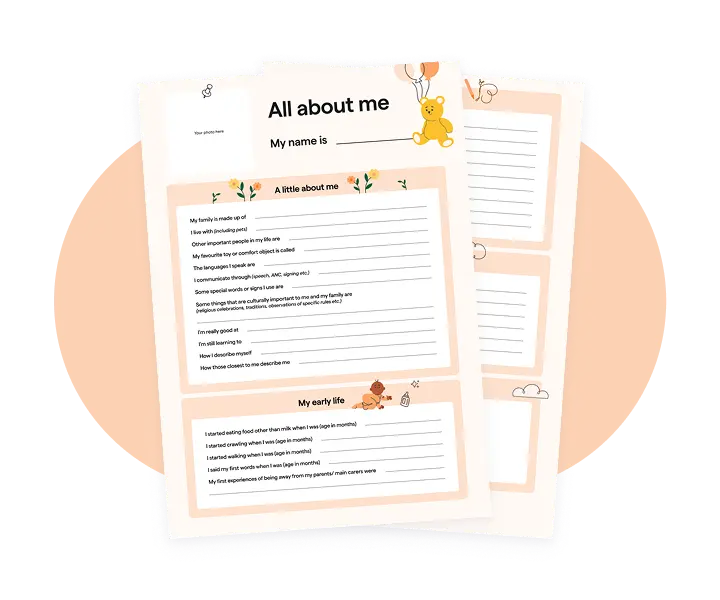settings
children
With Famly since
Like any role where caring and responsibility are central to what you do, difficult conversations are bound to come up now and again. No one enjoys having to have a hard conversation, but there are ways you can make these situations less intimidating for you and easier on the parents and carers you’re meeting with.
To find out how, we’ve collected some top tips for addressing those tricky topics with parents and carers.

Create trusting and transparent relationships from the start
“Create trusting and transparent relationships from the start” might not be great advice if you’re dreading a conversation you have to have tomorrow, but it’s certainly worthwhile in the long term. What’s more, there’s plenty of advice for how to build those strong, collaborative partnerships with parents and carers from the start:
- Put honest and open communication at the heart of your interactions with families.
- Acknowledge and celebrate that parents and carers are the experts when it comes to their own children.
- Welcome parents and carers into your nursery sincerely and frequently.
- Offer parents plenty of ways to get in touch and get involved.
The idea is, that the better the foundations you lay for a positive and open relationship with parents and carers from the start, the easier it will be when it comes to having those harder conversations.
Decide how to approach the topic at hand
If you already have a positive relationship with the parents and carers you need to have a difficult conversation with, you’ll probably know how best they like to communicate.
For some people, an in-person meeting might feel too confrontational compared to a less formal phone call. However, for others, having a pending phone call booked into their calendar can feel too anxiety-inducing and they’d rather just talk about whatever needs to be discussed right away.
If you’re not sure, it doesn’t hurt to ask - you could even include a section in your welcome induction packs about how parents prefer to talk about more serious or sensitive matters. For example,
“In an emergency or if your child has an accident, we will always try to contact you immediately, usually by phone. However, if we need to discuss a serious or sensitive issue, such as regarding your child’s behaviour or development, how would you prefer this was done?”
However you decide to arrange the conversation, be sure to be mindful of the child at the centre. Do not talk about the child over their head or in front of their peers.
“When children are here, this is their space. I could think of nothing worse at the end of a lovely day at nursery, standing next to the legs of your parent and key person while they discuss how you went to the toilet.”
The big ideas

Don’t put off a conversation because you’re nervous
You may have heard the expression, “If it's your job to eat a frog, it's best to do it first thing in the morning. And If it's your job to eat two frogs, it's best to eat the biggest one first.” You’ll gain nothing by putting off a hard conversation until later - you’ll still have to have it and you’ll spend the whole day fretting about it.
Having time to prepare what you’d like to say isn’t necessarily a bad thing - you just have to be honest with yourself about how you are actually using that time - preparing, or procrastinating?
What’s most important is that you empathise with the individual parent or carer you need to talk to and decide on an appropriate, timely way to tackle the issue:
- Putting off an issue until later doesn’t make it go away. Most parents and carers would prefer to know as soon as possible if there is a concern about their child’s development, behaviour, or welfare.
- However, some parents and carers prefer fair warning before they need to have a hard conversation so they have time to feel relaxed and prepared. Just because you prefer to tackle an issue head-on doesn’t mean blind-siding a parent at pick-up and bombarding them with information is the right way to go.

Focus on the facts
In a caring relationship, like those you have with the children and families, there’s no point pretending you can be completely objective. You’re not a robot and they’re unique individuals. In fact, knowing the family’s context and history, as well as their child, can help you deal with sensitive issues in a way that’s tailored to that family and child’s needs.
That being said, when addressing a potentially sensitive issue, it can help to lean on concrete facts so that the message you’re trying to get across is clear. If you and a parent are in disagreement about certain events or issues, you may wish to offer evidence for what you’re saying - just be mindful that you present it as neutral information and not as a way to say “I told you so.”
Similarly, clouding what you’re trying to address with flowery language can just be confusing. You don’t need to be brutal in your delivery, but if you’re concerned about a child needing extra learning support for example, you need to be direct in delivering the facts about it, so the parents and carers clearly understand.
Allowing the facts to guide the conversation, as gently and honestly as possible, allows you to explain what’s going on in a judgement-free way, hopefully preventing parents and carers from becoming defensive or feeling attacked.
Work collaboratively towards a solution
If we take a moment to step back from how challenging some conversations can be, we can focus on the point of bringing in parents and carers to the conversation at all - so you can work together for the child.
You’re not having a conversion only to report something going on, but to find a solution together. Parents are not on trial or coming in to ‘answer for’ what’s going on with their child.
Ensure that you come from a place of curiosity, a genuine desire for collaboration, and humility. Respect parents’ ideas and feedback too. And be curious - knowing what parents’ and carers’ wishes are for their child is extremely important in regards to working on an action plan together.
For example, if you’re planning a meeting where you will address a possible educational or developmental support need with a parent, don’t come with a fully typed-out list of interventions. This is not collaborative and certainly won’t help the parents or carers to feel like an equal partner. Ensure that the plans or agreements you make on the back of the conversation are contributed to and agreed on, as far as possible, by everyone.

Pulling everything together
So what might all of this look like in practice? Let’s look at the case study below.
Context:
Florence is a four-year-old in your preschool. Her parents are currently going through a break-up and she is living with her mother in a new flat, as they had to downsize. She sees her dad every other weekend but her mother has shared that they are beginning a court case about long-term custody agreements. Dad has not been to drop-off or collect Florence since the break-up but there has been no change to his permission to do this.
What’s happening now?
There have been several incidents recently where Florence has pushed or hit other children and is finding it very hard to share resources with her peers. Florence is quicker to become sad, frustrated, or angry and most recently, threw a chair. Although each incident was explained to her mother individually, Florence’s behaviour seems to be continuing and escalating, and Florence is clearly struggling emotionally.
Knowing the facts about Florence and her family can help you support them, and guide you through addressing the issue with Florence’s parents in a sensitive and considerate way.
- You might invite the parents to a meeting to “discuss supporting Florence” as opposed to “discuss Florence’s behaviour.” The vocabulary you choose to address what’s going on can affect whether parents feel like you’re being accusatory or helpful.
- Given the situation, you may ask the parents if they’d prefer to meet separately.
- You may wish to lead with curiosity, so the parents have a chance to speak first. Do they feel Florence is coping well or needs some support? What have they noticed at home? How have they been supporting her?
- Although it is always good to come prepared with facts and evidence, arriving with a stack of signed incident reports can come off a bit too heavy-handed. You don’t want either of the parents to shut down or feel ashamed. Instead, you may wish to have some notes to hand if Florence’s parents ask for examples of what’s been happening, but don’t let it turn into “exhibit A”.
- While it can feel more comfortable for you, the old “compliment sandwich” technique can just muddy the water of how serious the incidents are. You can certainly remind them how much you care about Florence. After all, if you didn’t, this conversation wouldn’t be happening. You can also acknowledge that you know both of them love Florence and want the best for her - no one is here to be told off or to point fingers.
- You might have a few ideas for things you can do in the nursery to support Florence, so lead with those. You could also share things she’s really enjoyed or excelled at. This is a softer approach than telling the parents what they should be doing at home. They may be more likely to volunteer that they could try a similar approach at home or ask you for advice if you don’t start by giving them homework.
- Finish by making some notes or agreements about how you and they feel they can support Florence going forward. Use your knowledge of the family in question to decide how this agreement will be documented and discussed.
For example, some parents and carers might like the concrete nature of an ‘action plan’, while others might find that too formal or intimidating. Either way, ensure that each party feels they’ve played a part in the shared solutions you come to. - The meeting or conversation isn’t the end. Make sure that the parents or carers know that the lines of communication are open and you’re keen to keep in contact about whatever's been agreed, as well as how things are progressing.
Top tips from Alphabet House
Get top tips from a setting just like yours. Hear from Alphabet House on why and how they use Famly - and why they’ve never looked back.
Read their story










